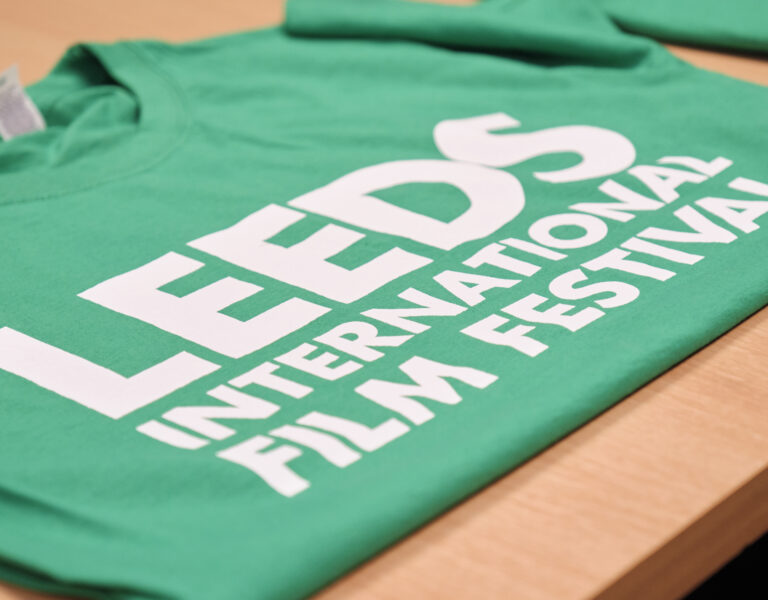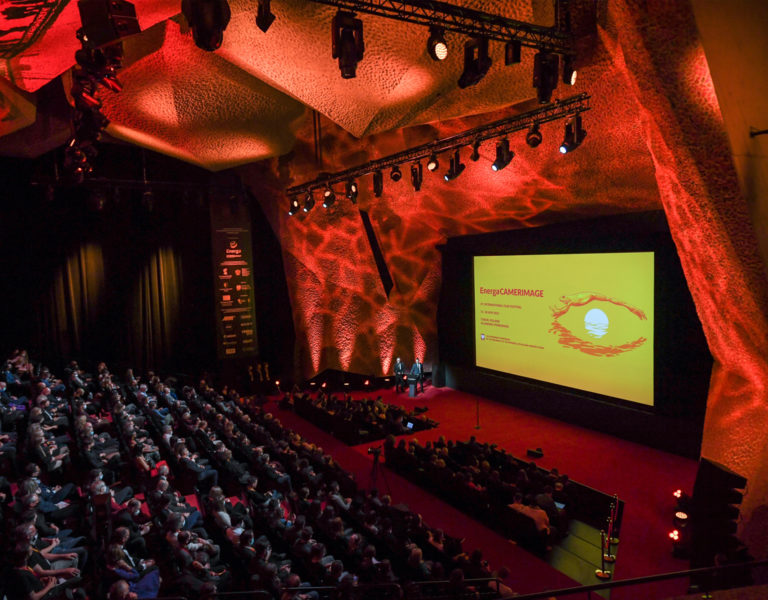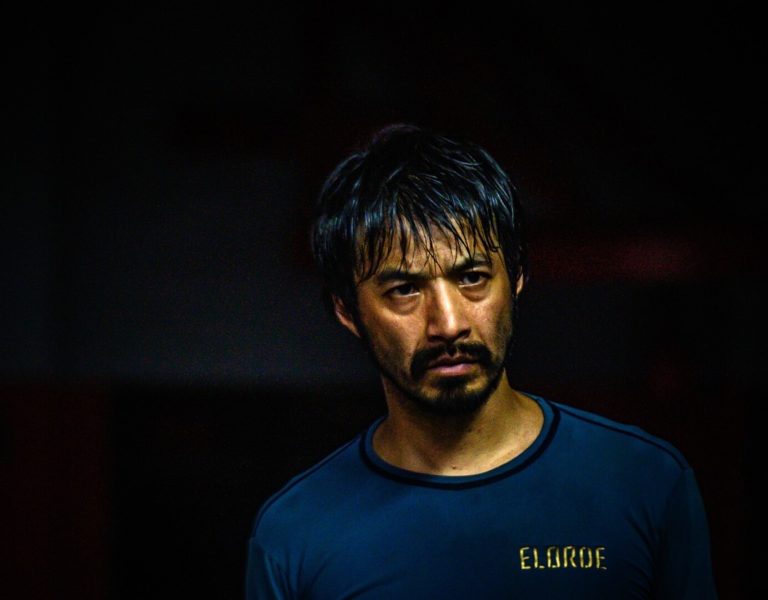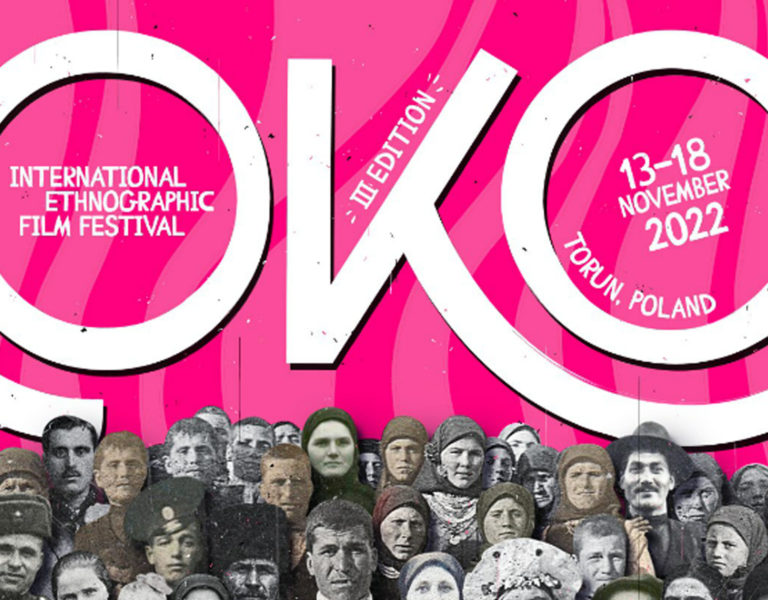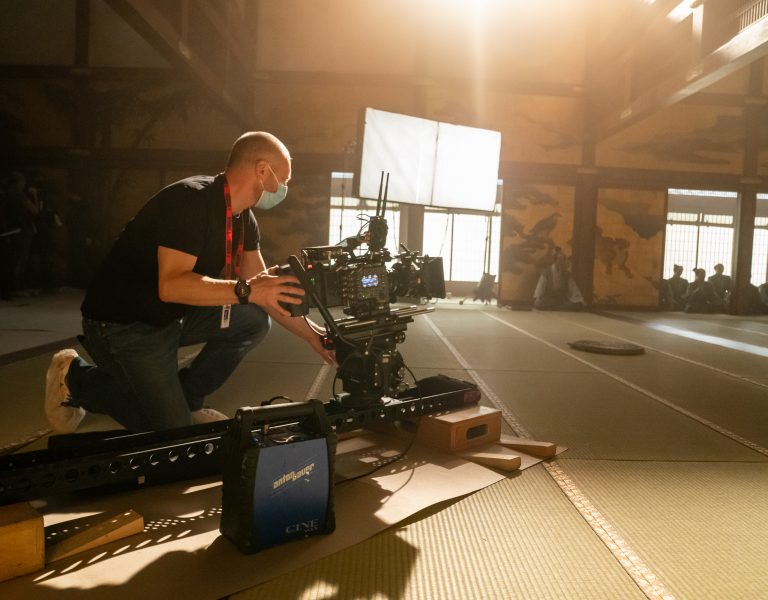FILMS, FROGS AND FESTIVITES
The cinematography community enjoys a deserved week in the spotlight at Poland’s Camerimage Film Festival.
Two days before the 31st edition of EnergaCAMERIMAGE Film Festival began on 11 November, the industry breathed a collective sigh of relief: SAG-AFTRA had reached a tentative agreement with the AMPTP, so their 118-day strike was off. But the ramifications from the belated good news from across the pond were still felt at the festival, and will resonate across film sets for some time to come.
The lifting of the strikes saw actors return to the promotional trail – in Camerimage’s case, Adam Driver and Willem Dafoe were the focus of paparazzi’s attentions when they attended the festival’s opening ceremony. It’s normally cinematographers who get their deserved moment in the spotlight here, but as Driver took his seat in the cavernous auditorium at CKK Jordanki in Toruń, Camerimage’s home since 2019, he was blinded by camera flashes.
Following his success at the Manaki Brothers Film Festival in the same category, Peter Biziou BSC also collected Camerimage’s lifetime honour at the festival’s opening ceremony to rapturous applause. The Academy Award-winning cinematographer of Mississippi Burning told the audience his origin story: “As a schoolboy, with my dear father, with some film animation in his small studio, I discovered we could make magic. When I saw our […] animation brought to life at 24 frames, it was indeed magic for me. My father lit a spark in me that has stayed with me through many adventures throughout my career and now has me standing here before you all.”
Driver would be honoured with the Special Award for an Actor, while Jon Kilik (The Hunger Games, Malcolm X) took home the Producer with Unique Visual Sensitivity Award. But it would be an evening of remembrance as well as celebration, for friend of the festival John Bailey ASC had passed away the previous day. Bailey, a cinematographer and director who served as Academy of Motion Picture Arts and Sciences president from 2017 to 2019, was eulogised by Camerimage festival director Marek Żydowicz, who had grown close to Bailey thanks to his regular visits to the festival.
Poor Things, the fantastical new feature from visionary director Yorgos Lanthimos, was the festival’s opening film, presented by cinematographer Robbie Ryan BSC ISC. Having won Venice Film Festival’s prestigious Golden Lion earlier in the autumn, Poor Things was a fittingly riotous way to kick off a week of cinematographic celebration. Ryan acknowledged the effect of the recent strikes on the film’s release: “It’s been a bit of a rollercoaster because there’s been the actors’ strike and a lot of the craft people from the film have been ‘upgraded’. It’s been really bizarre and fun, but we’ve missed the actors a lot, so it’s amazing to have Willem here on stage with us.” The DP was later joined by Dafoe and colourist Greg Fisher to delve into their technical and creative workflows.
Tussling for the Golden Frog in the Main Competition alongside Poor Things were: All of Us Strangers (dir. Andrew Haigh, cin. Jamie D. Ramsay SASC); El Conde (dir. Pablo Larraín, cin. Ed Lachman ASC); Ferrari (dir. Michael Mann, cin. Erik Messerschmidt ASC); Filip (dir. Michał Kwieciński, cin. Michał Sobociński PSC); Killers of the Flower Moon (dir. Martin Scorsese, cin. Rodrigo Prieto ASC AMC); Lee (dir. Ellen Kuras, cin. Paweł Edelman PSC); Maestro (dir. Bradley Cooper, cin. Matthew Libatique ASC); Napoleon (dir. Ridley Scott, cin. Dariusz Wolski ASC); The New Boy (dir. and cin. Warwick Thornton ACS); Society of the Snow (dir. J.A. Bayona and Pedro Luque SCU); and The Zone of Interest (dir. Jonathan Glazer, cin. Łukasz Żal PSC).
This year’s jury was headed up by Mandy Walker AM ASC ACS, whose film Elvis won last year’s coveted Audience Award. Also assuming judging duties were DP Anthony Dod Mantle ASC BSC DFF, editor Milenia Fiedler, DP Karl Walter Lindenlaub ASC BVK, production designer Jan Roelfs, and DPs Jonathan Sela ASC and Salvatore Totino ASC AIC.
Questions and quandaries
For the uninitiated, most of Camerimage’s screenings are accompanied by a fascinating Q&A with some of cinema’s leading lights. This year, there were 115 such sessions, kicking off on Sunday with Ferrari star Adam Driver (DP Erik Messerschmidt ASC would lead a Q&A later in the week).
In the Saltburn Q&A DP Linus Sandgren ASC FSF shared his memories of shooting with British director Emerald Fennell. “We had so much fun as you can tell, because Emerald is such a funny, wonderful, special person. Other than that, she has a very dark humour. […] We were laughing every day.”
Jonathan Glazer’s tense German-language film The Zone of Interest, set during World War II and portraying the banality of evil, provoked some fascinating discussion between cinematographer Łukasz Żal and producer Ewa Puszczynska. The film involved 360-degree sets with up to 10 cameras shooting simultaneously. Żal describes it as an “amazing process”, recalling how “at the very beginning, when I first met Jonathan, we were talking about how we were going to use 10 cameras at the same time and how were we going to do simultaneous playback… Now it seems so obvious, but when we first met it wasn’t.”
In addition to a Q&A following a screening of Main Competition film about love and loss, All of Us Strangers, in a Zeiss seminar exploring the relationship between analogue and digital filmmaking techniques, cinematographer Jamie D. Ramsay SASC, gaffer Warren Ewen, and colourist Joseph Bicknell (joining via video link) discussed how they collaborated to bring director Andrew Haigh’s film to life on screen. While sharing mood boards and cinematography treatments with the audience, Ramsay said while kit and tech is “fundamental to bringing the dream to life, the creative voice comes first.” He went on to share creative and technical processes such as lens choice and how he approached mixing analogue and digital worlds when shooting on film and working with virtual production for select sequences.
The Cinematographers’ Debuts Competition highlighted some of the DPs to watch out for over the coming years. Presenting Samuel Beckett’s life in a largely black-and-white narrative was German cinematographer Antonio Paladino who lensed Dance First. Paladino tested both colour and black-and-white at the rental house before production began and found that the monochrome approach was “way more forgiving” when shooting with the light in the same room, rather than shining through the window.
Eleanor Bowman travelled from Dublin with some of her crew to present Lies We Tell, an Ireland-set period piece also competing in the Cinematographers’ Debuts competition. Bowman was excited to see the film on the big screen at the festival: “It’s amazing – this is my favourite week of the year. There’s nothing like it: sitting in your seat when the lights go down. Being here with my own film is the closest my reality has ever been to my dreams.”
Artist’s touch
The third FilmLight Colour Awards, held on the Sunday of the festival, celebrated the art of colour grading around the world. Colourists can submit their work in five categories: theatrical feature; non-theatrical or television series production; commercial; music video; and a new category, Spotlight, open to colourists in a lower-budget feature.
22 nominees across the five categories were selected by an all-star line-up of judges, headed by Lawrence Sher ASC, before the winners were announced at the festival. The award for the grading of a theatrical feature went to Yvan Lucas at Company 3 for Barbie. “It brings me immense joy that colour grading is recognised as an essential part in crafting the look of a film,” said Lucas. “The experience of working on this film with Rodrigo [Prieto ASC AMC] and Greta [Gerwig] was one of the most artistically gratifying of my career.” Lucas worked closely with the cinematographer and director of Barbie to craft the distinct ‘Barbie look’ that defined the film.
The award for the grading of a TV series/episodic went to freelance colourist Dirk Meier BVK CSI for his work at D-Facto Motion on season one of The Pimp: No F***ing Fairytale (OT: Luden). The award for the grading of a commercial went to Tim Masick at Company 3 for his work on Zara Man, ‘SS23’ – Masick’s second win at the awards. The award for the grading of a music video went to freelance colourist Marina Starke for her work on ‘Horra’ by Mayyas – America’s Got Talent’s 2022 dance group winners, while the Spotlight award went to freelance colourist Cem Ozkilicci for his work at Uhoert on Possession.
“These diversely talented artists – and the inspiring work they helped craft – are a testament to the critical importance of the colourist in the art of filmmaking,” summarised jury head Sher.
Panels and parties
An essential seminar for the festival’s many early-career filmmakers was the BVK’s ‘Self-Organisation as a Freelancer in the Film Industry’. BVK managing director Dr Michael Neubauer began the session with some words of warning: “Some may leave this room in pale green!” Those audience members unperturbed by this opener were treated to Neubauer’s entertaining yet oh-so informative freelancing guide, including the importance of discipline and developing a strategy. The biggest takeaway? “Don’t become an egg-laying woolly milk-pig!” – in other words, don’t give the suggestion to your clients that you are good at every job, but rather have your strengths.
It wouldn’t be an industry gathering in 2023 without artificial intelligence featuring somewhere on the schedule: cue the PSC and ZAPA’s ‘AI in Cinematography’ panel, which examined the developments and challenges posed by the emerging technology. Of particular interest was creative technologist Maciej Żemojcin’s ever-evolving mind map of AI’s many uses in the filmmaking workflow.
Canon’s seminar – ‘Verdigris: a shoot story’ – was aimed at those shooting independent productions. Cinematographer Tania Freimuth and director Patricia Kelly shared how they created Verdigris, a film about two women from different backgrounds who form an unlikely bond. Discussing the Canon-shot production which went on to win the best independent film award at Galway Film Fleadh, Freimuth said she enjoyed shooting handheld and working with a lightweight camera as “it allows you to shift into those positions where you need to capture the action, achieving a spontaneous feeling and being in the moment with the character.”
Another fascinating and well-attended session in the Camerimage educational line-up was Jeff Gibbs’ ‘Don’t make a documentary, make a movie’ seminar in which he emphasised the importance of those working in the field being great listeners. The filmmaker, who has been a lifelong friend of documentary maker Michael Moore, shared highlights from their collaborations and lessons learnt from working on productions such as Fahrenheit 911 and Bowling for Columbine. As Gibbs highlighted, “the goal isn’t to tell people what we know, the goal is to create a discussion” when making documentaries. He also warned those shooting documentaries of the dangers of the film looking too staged: “Sometimes a doc is so well lit and beautiful, I don’t feel like I’m watching a documentary… It’s important to be spontaneous and flexible.”
In breaks between busy schedules, festivalgoers could visit the Camerimage Marketplace at the CKK Jordanki, where over 30 exhibitors presented the latest camera kit and more. Cooke Optics, meanwhile, went one step further with their ‘Open House’ setup in the Old Town, where cinematographers could test out the brand’s flagship S8/i Full Frame prime lenses and Varotal/i Full Frame zoom lenses on a mixed reality set.
As ever, the week presented a wealth of extra-curricular entertainment for partygoers to enjoy into the small hours, including events put on by Sony, Fujifilm, ARRI, Red, Hawk, Cinelab, Rosco and Panavision. Notably, some events were on a smaller scale this year to reflect the more restrained industry landscape.
At the halfway point of the festival, British Cinematographer joined forces with the British Society of Cinematographers, the American Society of Cinematographers, American Cinematographer and Netflix for our second Celebration of Cinematography. Held at Hotel 1231 at the heart of Toruń’s Old Town, the transatlantic soirée was the ideal opportunity for the industry to reconnect, to reflect on the challenges of the past year and to look ahead to exciting new projects.
The festival drew to a close with a glittering gala. A packed CKK Jordani saw deserving winners from across the globe collect their prizes and give speeches to an engrossed audience. The Bronze and Silver Frogs went to Robbie Ryan BSC ISC and Ed Lachman ASC respectively, with both cinematographers appearing via video to accept their awards. Ryan thanked the organisers for “putting on the most amazing festival and for getting people from all over the world to have such a great time”, before paying tribute to the jury and the Audience Award winning Poor Things director Yorgos Lanthimos who he deemed “an amazing cinematographer in his own right.” The El Conde DP Ed Lachman ASC lamented his absence from the festival before wistfully concluding his speech with the impactful sentiment: “Thank you, Camerimage, for being Camerimage.” Mandy Walker AM ASC ACS then presented the biggest award of the night to DP and director of The New Boy, Warwick Thornton ACS. The Australian filmmaker took to the stage to pay compliments to the Camerimage experience, saying: “I will forever be a student, and that’s the most beautiful thing about what we do. We will always be students of this art and of this craft.”
The ceremony concluded with all the award winners and those involved with the festival taking to the stage to receive their due plaudits. After a quick break, festivalgoers eager to squeeze in one last film rushed back to their seats for She Came to Me. The festival’s closing film was directed by Rebecca Miller and shot by Sam Levy, both of whom were joined on stage after the screening by two of the film’s cast, Peter Dinklage and Poland-born Joanna Kulig, for an insightful Q&A. Miller aptly said of the film before its screening; “At its core it’s a film about how life is art and how art feeds life.” Levy provided intel on the film’s most glaring stylistic choice, a constantly changing aspect ratio which reflected different elements of the characters’ geography and psyche. “Any sort of spiritual moment, like the ‘God light’ that Anne Hathaway sees, should be square because we took inspiration from Black Narcissus.” Miller also added that the aspect ratio would be square for “the place the [characters] felt their biggest love.”
–
Camerimage 2023 winners
MAIN COMPETITION
Golden Frog: The New Boy
cin. Warwick Thornton ACS
dir. Warwick Thornton ACS
Silver Frog: El Conde
cin. Ed Lachman ASC
dir. Pablo Larraín
Bronze Frog: Poor Things
cin. Robbie Ryan BSC ISC
dir. Yorgos Lanthimos
FIPRESCI AWARD
The International Federation of Film Critics Award for Best Film: The Zone of Interest
cin. Łukasz Żal PSC
dir. Jonathan Glazer
POLISH FILMS COMPETITION
Best Polish Film: Doppelgänger
cin. Bartłomiej Kaczmarek
dir. Jan Holoubek
FILM AND ART SCHOOL ETUDES COMPETITION
Laszlo Kovacs Student Award
Golden Tadpole: Cremation, Or The Quarantine Hotel
cin. Wen Lau
dir. Ning Qian
school: National Taiwan University of Arts (NTUA)
Silver Tadpole: Plastic Touch
zdj. Celia Morales
reż. Aitana Ahrens
szkoła: The Madrid Film School (ECAM)
Bronze Tadpole: Poor Boy Long Way from Home
zdj. Tuur Oosterlinck
reż. Jonas Hollevoet
szkoła: Sint-Lucas School of Arts, Brussel (LUCA)
DOCUMENTARY FEATURES COMPETITION
Golden Frog — best feature documentary: The Echo
cin. Ernesto Pardo
dir. Tatiana Huezo
DOCUMENTARY SHORTS COMPETITION
Golden Frog — best short documentary: Oasis
cin. Myriam Payette
dir. Justine Martin
DIRECTORS’ DEBUTS COMPETITION
under the patronage of the Polish Filmmakers Association (SFP)
Best Director’s Debut: Inshallah a Boy
cin. Kanamé Onoyama
dir. Amjad Al-Rasheed
CINEMATOGRAPHERS’ DEBUTS COMPETITION
under the patronage of the Polish Filmmakers Association (SFP)
Best Cinematographer’s Debut: A Song Sung Blue
cin. Jiayue Hao
dir. Zihan Geng
MUSIC VIDEOS COMPETITION
Best Music Video: Son Lux “Undertow”
cin. Drew Bienemann
dir. Alex Cook
TV SERIES COMPETITION
Best Episode: The Offer: A Seat at the Table
cin. Salvatore Totino ASC AIC
dir. Dexter Fletcher
AUDIENCE AWARD
Poor Things
cin. Robbie Ryan BSC ISC
dir. Yorgos Lanthimos
